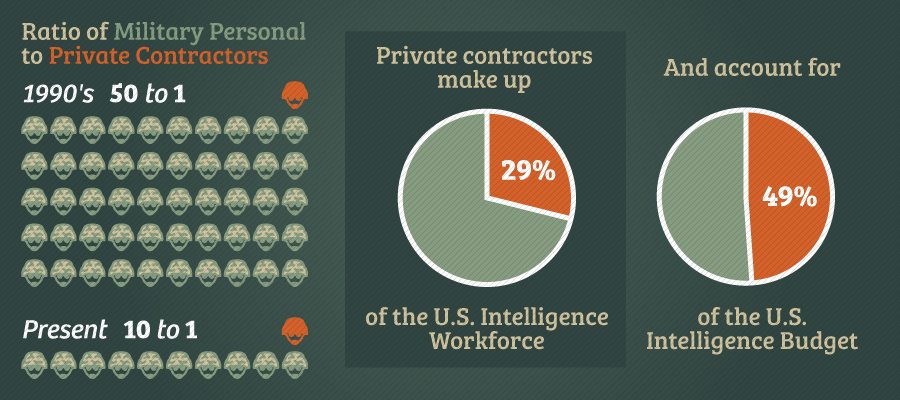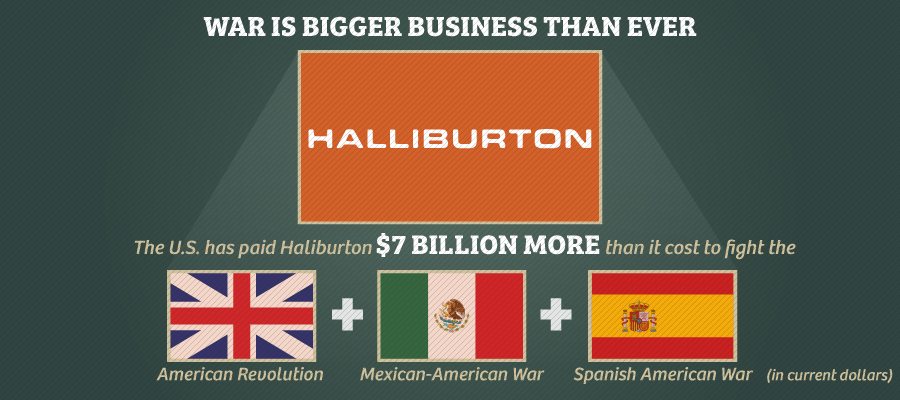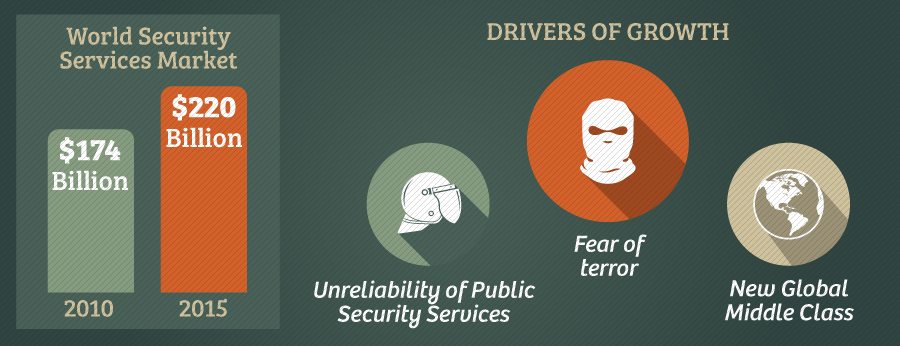Private security contractors role in peace is important since the US is both the largest consumer and producer. The United States is by far the largest consumer of private security contractors in the world. This being said, the US is also the largest producer of said security contractors, with many serving in the armed forces before joining private defense firms at a later date. In an age where the primary enemy combatants are non-state actors and placed in myriad and ever-changing locations, private defense contractors provide the flexibility the U.S. government seeks for quick and decisive threat response.
With support for large “official” military involvement steadily eroding since 9/11, private defense contractors have stepped into a more prominent role. In the words of a report by the International Peace Research Institute, “private contractors fill the gap between geopolitical goals and public means.”
Industry Growth
Private defense contractor firms are a relatively new addition to the defense industry. While corsairs, privateers, and mercenaries have been around for most of western history, they faded from existence in the 19th century. It wasn’t until 1965 when a group of ex-SAS British veterans started the firm WatchGuard International that modern private security contractors resurfaced.
As conventional military budgets fell at the end of the Cold War, close to 6 million soldiers from Western military powers were relieved of duties through the 1990s. Fast forward to the year 2006 and over 100,000 private security contractors worked for the US Government in Iraq, a tenfold increase from the Persian Gulf War some 15 years prior.

While titularly private security contractors work in “support” roles for clients, the services offered have expanded over time. Depending on who hires private security contractors, services can range from combat support, which includes the ability to coordinate and conduct large-scale operations, long-distance strikes, and surgical strikes, to operational support, including training and intelligence, to general support, such as transportation and medical assistance.
Many Private Security Contractors are Hired by the State Department
Though private security contractors are not for offensive maneuvers, many are armed similar to members of the military. And they may fire in self-defense, or attack at an order from the State Department. Because many private security contractors work for the State Department, and not the military, contradictory security plans can surface. A recent report from Congress notes private security contractor actions requiring discipline during the Iraq war. Many contractor cases of abuse were by those working for the State Department and not the military.
With the unique and rapidly changing security concerns of states, corporations, and individuals in the 21st century, it’s not surprising that private security contracting is booming. The $100 billion-plus-a-year industry is currently worldwide in over 50 countries. It’s not just a western phenomenon either, with the UAE recently paying Erik Prince, the founder of Blackwater Worldwide $529 million to create an elite guard for the emirate.
As of 2012, Russia was openly talking of using private security contractors honed into a standing force to further interests abroad. Looking back to 1995, insurgent rebels were taking over large swaths of Sierra Leone, and the country looked to have fallen, save for Executive Outcomes, private defense contractors armed with state of the art artillery and aircraft.
Cost-Effectiveness
In the recent conflicts in Iraq and Afghanistan, the cost of contractor fraud and waste approached $30 billion. As with many large federal contractors, bids for large projects from firms with little experience are not common. So most awards go to large companies. However, big firms involved in a debacle can simply rebrand, rename, and relocate, avoiding recognition for their tarnished brand.
With different restrictions in different nationalities, firms will often relocate to escape particular laws. For example, Blackwater USA went through such a process after its contractors gunned down 17 Iraqi civilians. The company rebranded as Xe Services LLC and Academi in the matter of a few years.
In Support Roles, Private Security Contractors are Cheaper
Despite charges of massive waste in recent US-led wars, in many support roles, and particularly for nations without as advanced of a standing military, private security contractors are often an efficient solution. A 2005 cost comparison by the Congressional Budget Office noted that in support roles, the use of contractors was 90% cheaper than forming support organically from an existing troop base.
The cost of training, equipment, salary, and benefits, coupled with a set tour of duty lengths buoys up the cost of using troops in support roles. When roles are purely logistical (non-combat) and perhaps only needed for short periods, the use of full-time troops is often overkill.
Defense Needs Can Quickly Change
The military is particularly suited for the use of external employees on a contract basis due to the fact that defense needs fluctuate so abruptly and radically. In a comment on troop psychology, Undersecretary of Defense for Acquisition, Technology, and Logistics, Dr. Ashton B. Carter notes that “all studies show that [organic support] is more expensive than contractors and a distraction from military functions for military people.”

For individuals, corporations, or states without strong standing military power, the cost-effectiveness of contractors is positive. And it increases in relation to the “catch-up” costs seen in terms of time, money, and the cost of security mishaps needed to develop defense expertise organically.
The continued and increased use of private security contractors is evidence that they are cost-effective (or the only option) in many circumstances. From 1990 to 2000, private military contractors were in over 80 conflicts, as opposed to only 15 from 1950-89. Though the first gets most of the notoriety, there are three main ways in which private security contractors provide services.
Three Main Ways Contractors Provide Service
Firstly, military combatant companies provide forces for combat. This form of private security contract work is a slim minority of the overall industry, and often receives the derogatory title of”mercenaries.”
The second option includes military consulting firms or firms that provide training and military advising, though some of these firms have also expanded to include security and bodyguard services.
The third type of private security contractor is military support firms. These firms provide nonlethal aid and assistance, ranging from maintenance, technical support, and explosive ordnance disposal, to intelligence collection and analysis.
Outcomes
Problematically, private security contractors often work in the moral vacuum of being non-state entities who act with the backing of state actors. The propensity to deploy private security contractors to war zones or regions in chaos deepens the ability of firms to move into moral grey area through the lack of accountability measures often present in destabilized regions.
Many wrongs committed by state military actors and private defense firms have been prosecuted for atrocious acts in war zones. Most notable was the Baghdad shootings of 2007 in which Blackwater guards shot and killed 17 Iraqi civilians. Another example is the DynCorp’s sex-slavery and trafficking horror story in Bosnia.
Crafting a Clear and Ethically Sustainable Role
Fortunately, there are evolving international laws, corporate ethical codes, and the laws of individual states. The hope is to craft a clear and ethically sustainable role for private security contractors. Aside from several amendments to bills in 2007 and 2008, President Obama’s 2010 budget signaled change in the US government. It noted that the administration “will clarify what is inherently a governmental function and what is a commercial one; critical government functions will not be performed by the private sector for purely ideological reasons.”
Fear of terrorism and crime, a growing global middle class with assets to protect, and a number of surfacing non-state threats are also good news for the private security industry. And the industry expects to grow to nearly $220 billion. The US currently accounts for around 35% of security services spending. But should change in coming years with growth in countries such as China, India, Brazil, Mexico, and also South Africa.
What is Driving Growth of Private Security Contractors?

Recent outcomes of larger-scale private security contractor firm use include nations, corporations, and individuals globally. Most notably, over recent years, the UN has increasingly used private security contractors for guards. And they also use them for a range of services relating to humanitarian affairs, peace-building, and development.
With new bills in the works, Russia is potentially set to open the doors for close to half a million new private defense jobs. Some of the most newsworthy included the occupation of Ukraine. The South African firm Executive Outcomes has a large presence in most African war zones. They include Sierra Leone, Angola, Uganda, Botswana, Zambia, Ethiopia, Namibia, and also Lesotho. Though their official mission is to promote peace on the continent, reports have centered on their role in diamond dealing and exploitative practices.
Related:
- 25 Best Peace Studies Masters Degrees
- Peace and Conflict Resolution Jobs
- 25 Best Peace Studies Degrees
- Why Study Conflict Resolution and Peace?